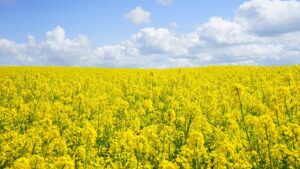
A mechanism for confirming exporters as commodity producers, which will allow them to avoid paying the recently introduced 10% duty on exports of soybeans and rapeseed, should be in place by the end of next week, said Deputy Minister of Economy, Environment, and Agriculture of Ukraine Denys Bashlyk.
“It will be as convenient as possible, the software is already 90% ready. The Cabinet of Ministers will make a decision next week,” he said at the Forbes Agro conference in Kyiv on Friday.
Bashlyk noted that there are currently situations where producers export and are forced to pay duties because there is no such confirmation mechanism.
According to him, the confirmation mechanism is planned to be implemented through the state agricultural register so that it does not take too much time, does not require “a million references” and the need to confirm each batch.
As for the duties already paid by commodity producers, the government is preparing amendments to the law on the state budget for 2025, which will allow the return of duties already paid, the deputy minister said.
In general, he noted that the Ministry of Economy is against the abolition of the 10% duty on exports of soybeans and rapeseed.
“We understand the risks that farmers may face, but it should be noted that there is another side to this story — the creation of a separate fund to which the paid duties will be transferred. And so, should the abolition of these so-called soybean amendments be on the agenda today? No, it should not,” Bashlyk said.
Farmers at the Forbes Agro conference criticized the introduction of this duty because, in their opinion, processors at the beginning of the war, due to logistics problems, received high profits at the expense of agricultural producers, and now processing does not require such privileges and should pay the market price for raw materials, competing with importers. According to the speakers, these duties will result in a reduction in rapeseed and soybean crops and a deterioration in crop rotation.
The head of Ukraine’s largest oil producer, Kernel, Yevgen Osipov, canceled his planned interview at the conference, and the founding editor of Forbes Ukraine, Volodymyr Fedorin, who was supposed to conduct the interview, said that Osipov did not like the publication’s article criticizing the duty.
As reported, Law No. 13157, signed by the president on September 2, stipulates that agricultural producers and cooperatives that export their own products will be exempt from paying duties. However, due to the lack of clear rules for documentary confirmation of the origin of goods, the mechanism does not actually work, and the export of oilseeds has been largely blocked.
A number of agricultural associations, including the All-Ukrainian Agrarian Council (VAR), the Ukrainian Agribusiness Club (UAC), the Ukrainian Grain Association (UGA), the Ukrainian Agrarian Confederation, as well as the European Business Association and the American Chamber of Commerce, have appealed to the Cabinet of Ministers and the Verkhovna Rada to repeal the law establishing a 10% duty on exports of soybeans and rapeseed as soon as possible.
On September 19, MP Yaroslav Zheleznyak (Voice faction) registered a corresponding bill No. 14055 on the repeal of the “soybean and rapeseed amendments.”

The Argentine government has temporarily abolished high export duties on grain, soybeans, and soybean products, which previously ranged from 25% to 31%, until October 31, 2025, according to GrainTrade. The move is aimed at increasing foreign exchange earnings and stabilizing the national currency amid the economic crisis.
The political context of the decision is linked to the defeat of President Javier Milei’s party in local elections in the province of Buenos Aires. This has heightened investor doubts about the government’s stability and caused the peso to devalue. The central bank has spent more than $1.1 billion of its reserves over the past three days to support the currency market. In total, Argentina has already used $20 billion in funding from the IMF this year.
The abolition of tariffs will sharply increase the supply of soybeans, soybean meal, and oil on the global market. On September 22, November soybean futures in Chicago fell by 1.5% to $371.1/t, and over the week, the decline was 3.3%.
Experts predict further pressure on prices, especially if trade negotiations between the US and China stall.
China, which diversified its imports after the trade war with the US, increased its purchases of Argentine soybeans to a six-year high of 8.81 million tons last year. This reduced domestic processing: in July, about 31% of enterprises were idle, and now the figure is even higher, according to the CIARA-CEC exporters’ association.
For Ukraine, Argentina’s decision means:
increased competition in key markets in Europe and Southeast Asia;
lower export prices for soybeans and soybean products;
pressure on domestic prices from processors due to cheaper soybean meal and oil from Latin America.
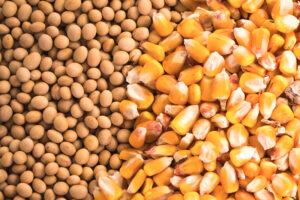
One of Ukraine’s largest grain market operators, Nibulon, has begun harvesting late grain crops in the Cherkasy and Khmelnytsky regions, according to a Facebook post by the grain trader’s press service.
According to the report, the Chyhyryn branch in the Cherkasy region, where corn is harvested on an area of 9,500 hectares, was the first to start harvesting late grain crops in the 2025 season.
“Despite the difficult weather conditions during the growing season, corn in this region yielded 7 tons per hectare. The total planned gross corn harvest for the holding is 180,000 tons. The total area under this crop this year is 22,577 hectares. As of today, the first 2,000 hectares have been threshed. Eight combines and 70 grain trucks are involved in the corn harvest,” the agricultural holding said.
In addition, the soybean harvest has begun in the Khmilnytskyi and Kamianets-Podilskyi clusters. The first 500 hectares have been threshed with a yield of 3.2 tons. In total, they have 9,600 hectares to harvest. Twelve combines and 40 grain trucks are working on threshing this crop.
Immediately after harvesting, Nibulon will cultivate the soil for sowing in 2026. The priority is strip-till and deep loosening.
“Overall, 2025 has been a difficult year for agriculture. This year’s weather, in particular the lack of productive rainfall in the central and especially southern regions of Ukraine, did not contribute to record harvests. Since the beginning of the year, only 220 mm of precipitation has been recorded in the Chyhyryn area, and it should be noted that a significant part of it was not productive and was not effective in fully meeting the moisture needs of corn, especially at critical stages of plant development,” the agricultural holding noted.
Nibulon was able to achieve a stable harvest despite the moisture deficit by implementing a set of resource-saving agricultural technologies, including economical soil cultivation, adherence to early sowing dates, and the competent selection of corn hybrids with FAO 220–250, which are highly drought-resistant and release moisture quickly during ripening.
Nibulon LLC was established in 1991. Before the Russian military invasion, the grain trader had 27 transshipment terminals and complexes for receiving agricultural crops, a capacity for one-time storage of 2.25 million tons of agricultural products, a fleet of 83 vessels (including 23 tugboats), and owned the Mykolaiv Shipyard.
Before the war, Nibulon cultivated 82,000 hectares of land in 12 regions of Ukraine and exported agricultural products to more than 70 countries around the world. In 2021, the grain trader exported a record 5.64 million tons of agricultural products and supplied record volumes to foreign markets in August (0.7 million tons), in the fourth quarter (1.88 million tons), and in the second half of the year (3.71 million tons).
The grain trader is currently operating at 32% of its capacity, has created a special unit for demining agricultural land, and has been forced to move its central office from Mykolaiv to Kyiv.
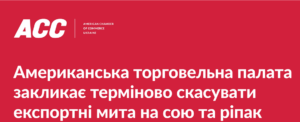
International business, united by the American Chamber of Commerce in Ukraine, emphasizes the need to urgently cancel export duties on soybeans and rapeseed.
They were introduced on September 4, 2025 in accordance with the Law of Ukraine #4536-IX “On Amendments to the Tax Code of Ukraine and Other Legislative Acts of Ukraine in connection with the Adoption of the Law of Ukraine ”On Integrated Industrial Pollution Prevention and Control“ and in order to improve certain provisions of tax legislation” (Law #4536-IX).
The amendment on the introduction of export duties on soybeans and rapeseed was included in Law No. 4536-IX in violation of the principles of legislative technique, the Rules of Procedure of the Verkhovna Rada of Ukraine and the principle of stability of tax legislation. Such changes contradict Ukraine’s European integration course and Article 31 of the EU-Ukraine Association Agreement, worsen the investment climate, pose risks to the rule of law, and lead to losses for agricultural producers due to falling purchase prices and reduced acreage.
Since September 4, 2025, Ukrainian Black Sea ports have been blocked by ships and port railways by railcars carrying rapeseed and soybeans due to the unresolved procedure and criteria for applying the zero duty rate for agricultural producers. Thus, all exporters, including agricultural producers, cannot export their goods and suffer losses due to fines for demurrage of ships and other vehicles, excessive storage of grain in ports, extended insurance coverage, and failure to fulfill contracts with foreign buyers. Expensive goods are stuck in ports and are at risk from regular shelling of ports, as are the crews of foreign vessels whose customs clearance is blocked. Foreign exchange earnings (up to USD 2 billion) for rapeseed and soybean seeds in 2025 have been effectively disrupted. Currently, at least nine vessels are in such a standstill, and according to preliminary estimates, the estimated losses for the business will be between USD 5 and 10 million per month.
In view of the above and the current critical situation, the American Chamber of Commerce calls on the Government to
AMERICAN CHAMBER OF COMMERCE, DUTIES, RAPESEED, SOYBEANS, UKRAINE

The Agrotrade agricultural holding has begun harvesting soybeans, sunflowers, and industrial hemp, according to a statement posted on its Facebook page.
“The campaign is underway simultaneously in several regions: soybeans in Kharkiv and Sumy regions, sunflowers in Kharkiv region, and industrial hemp in Chernihiv region. Currently, 9% of soybeans, 7% of sunflowers, and 54% of industrial hemp have been harvested,” the agricultural holding company said.
According to Alexander Ovsyannik, director of the agro-industrial department, industrial hemp has been harvested on almost half of the area, with yields within the norm.
“This is the third year of experimenting with this crop, and in the fall, we will decide whether to scale up this direction. As for soybeans and sunflowers, it is too early to draw conclusions: early soybeans were affected by drought, while late soybeans are still in good condition, and the situation with sunflowers depends on the region,” Ovsyannik said.
In the 2025 season, Agrotrade used 23 combine harvesters and about 60 trucks to quickly transport the harvest.
As reported, in 2025, Agrotrade allocated almost 13,000 hectares for soybeans, 11,000 hectares for sunflowers, and 333.5 hectares for industrial hemp.
The Agrotrade group of companies is a vertically integrated holding company with a full agro-industrial cycle (production, processing, storage, and trade in agricultural products). It cultivates more than 70,000 hectares of land in the Chernihiv, Sumy, Poltava, and Kharkiv regions. Its main crops are sunflower, corn, winter wheat, soybeans, and rapeseed. It has its own network of elevators with a one-time storage capacity of 570,000 tons.
The group also produces hybrid seeds of corn, sunflower, barley, and winter wheat. In 2014, a seed plant with a capacity of 20,000 tons of seeds per year was built on the basis of the Kolos seed farm (Kharkiv region). In 2018, Agrotrade launched its own brand, Agroseeds.
The founder of Agrotrade is Vsevolod Kozhemyako.
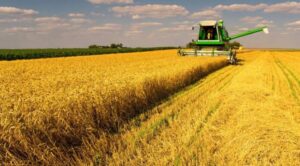
Let’s track the prices as of the end of June 2025 for the main grain and oil crops exported from Ukraine, as well as fluctuations in their value on the world market.
The price of wheat (France, FOB) was 235 USD/t, according to market operators on June 25, 2025. This is 1 USD less than last week, 6 USD more than the previous month, and 3 USD more than the previous year. The price of wheat (Ukraine, 2nd grade, CPT) for the central regions (June 26) was 192 USD/t. This figure remained unchanged during the week, decreased by 15 USD over the month, and increased by 45 USD over the year. For ports, the amount was 206 USD/t, which is 3 USD less than a week ago and 18 USD less than a month ago, but 19 USD more than a year ago.
According to the International Grains Council, the price of corn (USA, FOB) as of June 25 was 192 USD/t. This is USD 8 less per week and USD 16 less per month, but USD 3 more per year. The price of corn (Ukraine, CPT) on June 26 for the central regions was USD 204/t. It did not change during the week, but decreased by USD 4 per month and increased by USD 73 per year. For ports, it was 216 USD/t (also unchanged from the previous week, down 16 USD from the previous month, and up 3 USD from 2024).
“Let’s pay attention to the forecast for global corn production in 2025/26 MY. It has been reduced by 1 million tons to 1,276 million tons, compared to 1,225 million tons in the current season. However, the forecast for global consumption has been increased by 1 million tons to 1,269 million tons. Therefore, the estimate of final corn stocks has been lowered by 2 million tons (to 282 million tons). This will exceed the current season’s figure by 7 million tons,” said grain market analyst Alexander Korenitsyn.
As for the price of barley (France, FOB) as of June 25, it stood at USD 216/t. This is USD 6 less than a week ago and USD 5 less than a month ago, but USD 11 more than a year ago. Let’s analyze the price changes for barley (Ukraine, CPT). As of June 26, the price was (central regions) – 171 USD/t. This is 3 USD more per week and 46 USD more per year, but 30 USD less per month. For ports, the price is 188 USD/t, which is 6 USD more per week, 40 USD more per year, but 2 USD less per month.
Prices for major grain and oil crops exported from Ukraine, end of June 2025
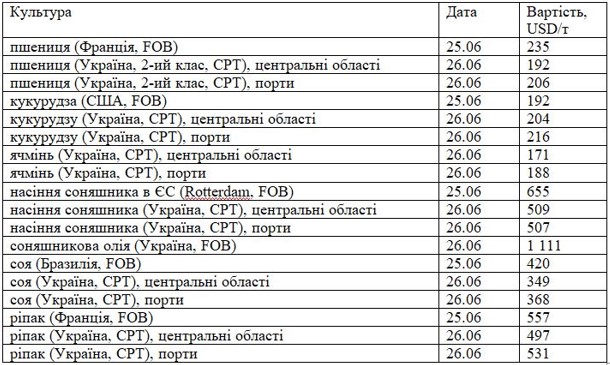
According to Oleksandr Serhiyovych Korenitsyn, the price of sunflower seeds in the EU (Rotterdam, FOB) as of June 25 was USD 655/t. The changes are as follows: +5 USD per week, -14 USD per month, and +170 USD per year. The price of sunflower seeds (Ukraine, CPT) on June 26 (central regions) was 509 USD/t. This is 8 USD less per week and 16 USD less per month, but 109 USD was added to the price per year. For ports, the cost is 507 USD/t. The price fell by 6 USD per week and rose by 9 USD per month and 148 USD per year. A ton of sunflower oil (Ukraine, FOB) costs 1,111 USD as of June 26.
The cost increased by $8 per week and by the same amount per month.
The calculation of price fluctuations for soybeans is based on its cost as of June 25 (Brazil, FOB) – $420/t. It decreased by $10 per week and by $16 per year, but increased by $15 per month.
“The price of soybeans (Ukraine, CPT) in the central regions was 349 USD/t on June 26, which is 8 USD less than a week ago, 4 USD less than a month ago, and 23 USD less than in 2024. The price for ports is 368 USD/t. It decreased by 14 USD, 13 USD, and 10 USD over the week, month, and year, respectively,” said analyst Alexander Korenitsyn.
The price of rapeseed (France, FOB) on June 25 was $557/t. Price changes: down $9 per week, up $7 per month, and up $55 per year. The cost of rapeseed (Ukraine, CPT) on June 26 for central regions is 497 USD/t (up 106 USD per year), for ports – 531 USD/t (up 110 USD per year).
agricultural sector, COST, DOLLAR, EXPORT, HARVEST, Oleksandr Korenitsyn, PORT, PRICE, SOYBEANS